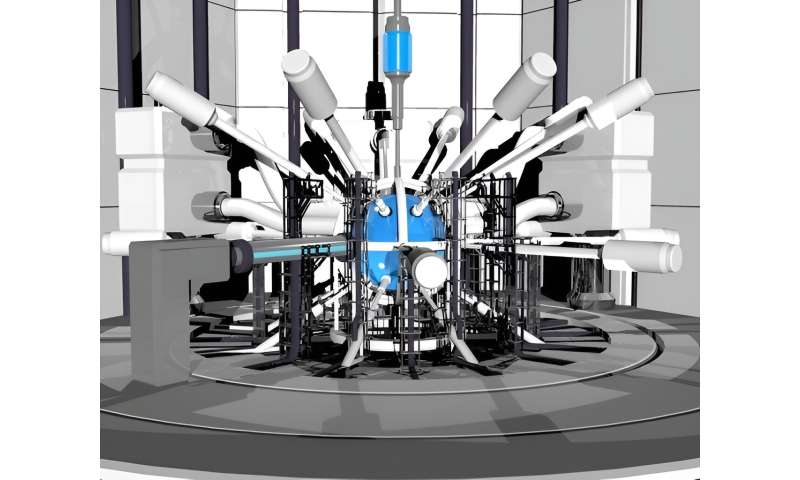Ex-Fusion and Tokyo Tech's laser fusion energy getting closer to commercialization

EX-Fusion Inc. has established a Collaborative Research Cluster focused on advancing liquid metal devices for the realization of commercial laser fusion reactors in collaboration with Tokyo Institute of Technology (Tokyo Tech). The signing ceremony to formalize this partnership was held on October 11, marking the official commencement of their joint efforts.
The "EX-Fusion Liquid Metal Collaborative Research Cluster' has been established with the support of the Tokyo Tech's Open Innovation Platform. It aims to provide support for research management, intellectual property strategy, and commercialization, with the ultimate goal of facilitating the societal implementation of research outcomes developed at the Collaborative Research Cluster."
In the midst of the urgent demand for energy supplies that do not emit greenhouse gases, laser fusion reactors are globally garnering high expectations as a sustainable energy source.
Nuclear fusion reactions are one of the natural phenomena through which the sun, like all other stars, generates immense energy, involving the fusion of atomic nuclei, such as hydrogen, under high-temperature and high-pressure conditions, transforming them into heavier nuclei like helium.
Laser fusion, on the other hand, is a technology that induces nuclear fusion reactions by irradiating fuel with lasers, resulting in the generation of energy. Leveraging seawater resources, it offers a safe and sustainable energy supply option.
Furthermore, it possesses the ability to flexibly adapt to fluctuations in electricity demand, and over the long term, it is projected to be a key player in the drive towards decarbonization. However, while numerous research and development efforts are underway worldwide to address technical challenges and enhance energy efficiency, as of the present, commercial laser fusion reactors have not yet been realized.
Through collaborative research between EX-Fusion, which develops laser fusion reactors, and Tokyo Tech, which conducts academic research related to liquid metal fluid, the Collaborative Research Cluster aims to construct a concept for liquid fuel blankets suitable for laser fusion reactors. It will also develop the necessary liquid blanket component technologies while working broadly on joint research towards designing a blanket mock-up loop.
The insights and liquid metal technology group gained from this collaborative research are expected to be useful not only in fusion but also in a wide range of fields such as liquid metal mirrors and environmental purification technologies.
EX-Fusion is a startup company developing essential technologies for laser fusion reactors, including lasers and fuel targets. Through collaboration between EX-Fusion and Tokyo Tech, which is at the forefront of research on energy conversion systems using liquid metal fluid, they plan to jointly tackle such a wide range of technological applications, aiming to maximize the social implementation of these technologies.
The Collaborative Research Cluster will enhance the large-scale synthesis technology of high-purity, liquid, lithium-lead, fuel-breeding material, which is essential for commercial reactor operation, leveraging the technical expertise accumulated by Tokyo Tech. It will also develop the final optical system of the laser irradiation system applying liquid metal technology.
By integrating these technologies, the Collaborative Research Cluster will design a blanket mock-up loop. Furthermore, it will also consider applying the liquid metal technology developed through this collaborative research to low-melting-point metal mirrors for deep space exploration and environmental purification technologies such as seawater desalination.
By collaborating, EX-Fusion, which is developing laser and fuel target technologies for laser fusion reactor development, and Tokyo Tech, which is conducting research on energy conversion systems using liquid metal fluid, aim to accelerate the early realization of laser fusion energy.
Their work has been published in Corrosion Science and Results in Optics.

Research Topics:
- Research and development concerning the concept of liquid fuel breeding blankets for laser fusion reactors
- Research and development on high-purity synthesis technology for liquid fuel breeding material for laser fusion reactors
- Research and development on the final optical system for laser fusion reactors
- Research and development on environmental purification technologies utilizing liquid metal technology
Over the next three years, the Collaborative Research Cluster aims to advance the high-purity synthesis method for liquid fuel breeding material, which is key to the fuel cycle of laser fusion. This technology development aims to support fusion energy development happening globally. In addition, while conceptualizing the liquid blanket system, they will develop various technologies related to its longevity and operational efficiency.
By integrating these blanket technologies into the laser fusion reactors developed by EX-Fusion, they aim for the commercialization of laser fusion energy within the next 10 years.
More information:
Masatoshi Kondo et al, Corrosion-resistant materials for liquid LiPb fusion blanket in elevated temperature operation, Corrosion Science (2021). DOI: 10.1016/j.corsci.2021.110070
Eisuke Imaizumi et al, Fundamental study on optical performance of low-melting-point metal mirrors for space telescopes, Results in Optics (2023). DOI: 10.1016/j.rio.2023.100473
Provided by Tokyo Institute of Technology